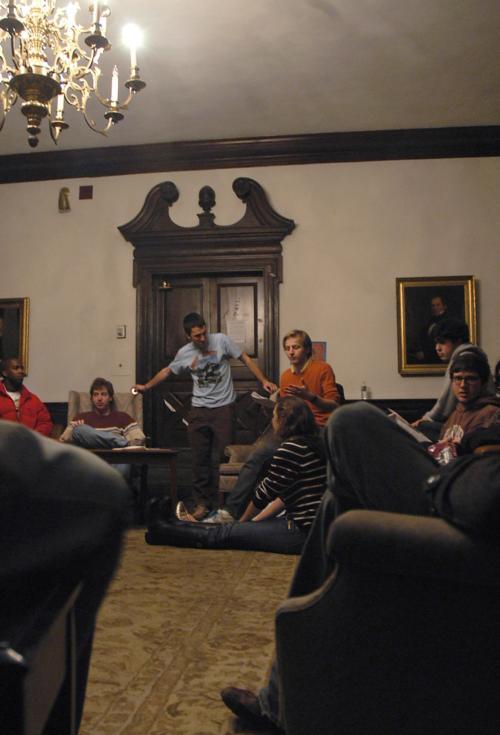
News
HMS Is Facing a Deficit. Under Trump, Some Fear It May Get Worse.

News
Cambridge Police Respond to Three Armed Robberies Over Holiday Weekend

News
What’s Next for Harvard’s Legacy of Slavery Initiative?

News
MassDOT Adds Unpopular Train Layover to Allston I-90 Project in Sudden Reversal

News
Denied Winter Campus Housing, International Students Scramble to Find Alternative Options
Calendar Reform Gains Traction
Referendum begins today; governing board approval seen as key

Nearly 30 students ringed the center of the Leverett House Junior Common Room last night as the Undergraduate Council marked the beginning of a get-out-and-vote campaign for this week’s referendum on calendar change.
The vote, to be held online from noon today until noon on Friday, will ask students to approve or condemn a UC proposal that calls for a longer winter break and a fall exam period ending before the December vacation.
“I think tonight marks the beginning of a grassroots movement that will change the academic calendar here at Harvard College,” said UC Representative Jon T. Staff V ’10. “I think that if all these people come together and push and make it vociferously known that Harvard needs to change its calendar... we can have great success.”
Following a Sunday council meeting, UC President Ryan A. Petersen ’08, the primary advocate of the proposal, said that “unlike any other time in the last 50 or 60 years when students have been talking about this issue, this is a time when change can and will happen if this referendum goes through.”
Yet as student representatives raise the pitch of their campaign to reform the College’s unusual academic calendar—which has fall term final exams coming after December break—they face a long and uncertain road to their goal.
ROAD TO REFORM
The UC referendum, accessible at uc.fas.harvard.edu, will gauge student sentiment on a new version of the academic calendar endorsed by the UC earlier this month. A successful referendum would represent an advocacy tool for Petersen, who is urging Harvard’s governing boards to change the calendar.
The UC’s Calendar Reform Act calls for both the fall and spring examination periods to be shortened by two days each, with reading periods kept virtually intact. Fall term exams in 2008 would end on Dec. 22, with the break lasting until Jan. 19, 2009. The school year would end on May 12—a week and a half before the date set by the current calendar.
Advantages to the new configuration cited in the UC proposal included the improvement of student mental health, savings on January heating costs, and easier scheduling for athletic teams.
The final decision on the calendar will fall to the seven-member Harvard Corporation—the University’s top governing board—as well as to the alumni-elected Board of Overseers. Petersen sent a letter to the Corporation last week urging them to revisit the calendar.
At the same time, Petersen says, he is hoping to bolster his case by gaining backing from professors.
Petersen can count Dean of the College Benedict H. Gross ’71 as a key supporter of his push. Gross said in an interview Friday that he hoped the UC’s calendar campaign “got the attention of the president and Corporation.”
While the Calendar Reform Act proposed a revamped calendar for the 2008-2009 academic year, change may not come so fast. “My sense is that if we were to decide it this year, it would probably take two years to implement,” said Secretary of the Faculty David B. Fithian. Gross, too, said it would take at least a year or two for changes to be put in place.
FACULTY VOICES
Any Faculty vote on calendar change would hinge on when professors approve the general education curriculum proposed to replace the Core. Three Faculty meetings remain this spring, including one today, for professors to consider the legislation. Outgoing interim Dean of the Faculty Jeremy R. Knowles has said the issue of calendar reform wouldn’t be considered by the full Faculty until the general education curriculum was approved. He declined to comment further yesterday.
Petersen said that he was ready to push for his proposal even if calendar reform doesn’t make it onto the Faculty docket this spring.
“If the faculty don’t have time to bring this up by a vote at their meeting, I think this could be accomplished by a vote of the Corporation along with support from the faculty through more unofficial channels,” he said.
Two members of the Faculty Council, the Faculty’s 19-member governing body, said yesterday that they favored calendar change.
“I personally think that both students and faculty can benefit from a few weeks free of obligations [over the winter holiday],” said Weary Professor of German and Comparative Literature Judith L. Ryan. “I think it’s a good way of keeping everybody healthy.”
Ryan said that she grew used to a more standard system while teaching at Smith College, and found it “much easier to handle,” because she did not have to grade exams during intersession while also preparing for spring semester.
And historian Laurel Thatcher Ulrich, the 300th Anniversary University professor, agreed. “Harvard’s elongated semester contrasts starkly with those of other research universities,” she wrote in an e-mailed statement. “I certainly wouldn’t oppose a change.”
—Brittney L. Moraski contributed to the reporting of this story.
—Staff writer Christian B. Flow can be reached at cflow@fas.harvard.edu.
Want to keep up with breaking news? Subscribe to our email newsletter.
